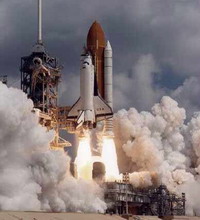Discovery's astronauts examine space shuttle for any signs of launch damage
The astronauts examined Discovery space shuttle's wings for any signs of launch damage as they gained on the international space station with every orbit of Earth.

The standard inspection is an even higher priority this time because of questions about possible flaws in three wing panels.
Flight director Rick LaBrode said a preliminary look at digital images of the wings revealed nothing of significance, but it will take another few days before experts on the ground finish analyzing everything.
Commander Pamela Melroy and her crew used a 100-foot (30.5-meter) boom to survey Discovery's wings and nose, which are exposed to as much as 3,000 degrees (1,648 Celsius) during re-entry.
Before Tuesday's launch, a NASA safety group recommended that the flight be delayed because there may be some cracking beneath the coating on the three panels. But senior managers decided to proceed, saying it was an acceptable risk.
NASA wants to make sure none of the protective coating has chipped away and nothing else is wrong with the reinforced-carbon panels before bringing Discovery home.
Columbia was destroyed during re-entry 4 1/2 years ago because of a hole in the left wing, left there by flyaway fuel-tank foam.
Just as important to the wing analysis will be the hundreds of digital pictures snapped by the three space station residents as Discovery makes its final approach for Thursday morning's docking. The shuttle will do a slow-motion backflip, exposing its belly.
Discovery is delivering a new room for the space station that is about the size of a school bus. It is the first live-in addition since 2001.
The pressurized compartment, called Harmony, will serve as the docking port for Europe and Japan's laboratories, which will be launched on the next three shuttle flights.
Onboard preparations for the docking and the first spacewalk of the mission, set for Friday, were interrupted by repeated computer and cable problems.
"We seem to have had more than our fair share of bad cables," Melroy said, sighing, as she struggled to get a continuous stream of readings from one of the shuttle's fuel cells.
Once Discovery arrives at the space station, the seven astronauts will have little if any time to deal with problems.
They are facing the most challenging construction work ever attempted in a single mission: installing Harmony, moving a massive girder and set of solar wings on the station, and pulling out those solar wings and radiators.
Four spacewalks are planned to accomplish all this, and a fifth will demonstrate a repair method for shuttle thermal tiles.
Subscribe to Pravda.Ru Telegram channel, Facebook, RSS!


